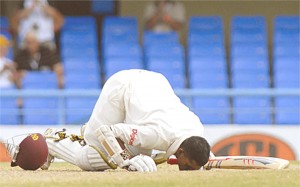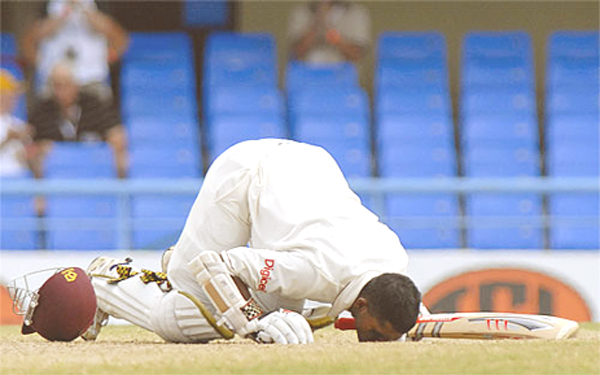Shivnarine Chanderpaul’s accession to the top of the pile in the International Cricket Council’s best test batsman ratings takes its place beside CARIFESTA as a fitting tribute to the capacity of the Caribbean to achieve.

The accolade derives its significance, first, from the fact that, measured by the ICC’s yardstick, it bests, at least for the time being, the batting feats of several able if ageing champions – with names like Hayden, Tendulkar, Ponting and Kallis coming easiest to mind. Secondly, and more significantly, the accolade coincides with a painful and protracted period of drought and depression in Caribbean cricket.
These are times when persistent failure on the cricket field have robbed the region one of the few reasons for celebration. The bragging rights which our cricket had handed us used to provide some measure of emotional compensation for an existence that has otherwise been characterized mostly by frustration and underachievement – socio-economic quagmires and a succession political promises which, up intil now, have borne no real fruit.
In a sense the gradual loss of faith in the prowess of our cricketers bears a striking resemblance to the loss of faith in Caribbean societies themselves – the former manifesting itself in the absence these days of those robust and raucous celebrations that used to attend victory after victory and the latter in a persistent migratory pattern that has swelled the ranks of the Caribbean diaspora.
What makes the decline of our cricket so devastating is the fact that it robs us of one of just a handful of ‘world class’ products with which we can adorn the international stage. In short, the decline of our cricket leaves the Caribbean with little to shout about.
Whether or not the accomplishment of the ‘tiger’ – a soubriquet which, ironically, pays tribute to what some say is an unentertaining but consistently rewarding doggedness – can either serve as an incentive for the revival of our cricketing fortunes or a rekindling the diminishing regional passion for the game, of West Indian fans, we salute Chanderpaul in much the same way that we herald the tenth staging of CARIFESTA. Both, in their separate ways, provide us with a welcome interlude of celebration.
And if the accession of Chanderpaul to the throne of test batting reverberates around the Caribbean as a landmark in the regional game, CARIFESTA, similarly, evokes celebration of an accomplishment of what the novelist George Lamming described just the other day in Antigua as “one of the most profoundly political events that this region undertakes.”
Quite why, – as Joey Carew pointed out recently, Chanderpaul’s compatriots remain seemingly uninspired by his outstanding feats remain as big a mystery as the failure of CARIFESTA, after thirty sic years, to bring about a greater regard for a recognition of the sheer richness of the Caribbean culture and why there appears to be such meagre recognition of the particular role that our culture can play in helping to extricate the region from the quagmire of underachievement in which it appears caught fast. Both phenomena, the failure of Chanderpaul’s consistency to; lift the team and the failure of the region to invest in its regional cultural headquarters in much the same way that it has invested in a CARICOM Secretariat, are deserving of urgent and serious contemplation.
Chanderpaul, particularly of late, has simply been the world’s best batsman in what is, by far, the weakest of the more established teams in world cricket; and yet, for all the bitter disappointments that must surely diminish the celebration of his personal accomplishments, he brings game after game, innings after innings, the same focus and the same monumental concentration and the same fidgety doggedness, all of which, by now, may have become a mask with which to hide a considerable frustration over the paradox in which he finds himself.
The achievement befits the man. Ever since he first appeared on the test stage, fittingly, on home soil, Shivnarine Chanderpaul has evinced a unique application to the game. His career has symbolized the application, discipline and sometimes unbelievably dogged determination so sadly lacking in so many of his compatriots; and if we live in times and in societies where, all too frequently, commitment to noble ideals and honesty of purpose do not always reap the rewards that they deserve, the honoring of Chanderpaul makes the point that there can be exceptionas to even the most unpalatable rules.
The fact too, that the accolade of world’s best test batsman has been claimed by an unlikely West Indian – an advocate of patient, painstaking accumulation of runs rather than a dashing exponent of the art of breathtaking strokeplay – say a Richards or a Lara – is perhaps a poignant message to Caribbean cricket – a message from an ageing champion – that times have changed and that Caribbean cricket needs to be re-ordered to pay much more attention to focus than to flashiness. That is what the contemporary game demands.
Chanderpaul’s accomplishment too underscores the value of the contributions to Caribbean cricket – and, by extension, to the quest to unigy the Caribbean – by Guyanese and, as well, by descendants of, slaves, indentured labourers and, to a lesser extent, by the descendants of other waves of immigrants.
These, including some of ‘the tiger’s’ own outstanding predecessors – like Kanhai and Kallicharran – whose foreparents’ travails on the post-slavery plantations are so poignantly captured in historically significant but under-celebrated novels like Backdam People and High House and Radio, authored by one of the finest exponents of the use of creolese in literature -Rooplall Monar.
The truisms of Chanderpaul’s nationality and his ethnic origins, notwithstanding, all of us, whatever our ethnicity and wherever in the Caribbean we may come from, can claim him as our champion. That is cricket’s finest gift to the region.
The real significance of his accomplishment – apart, of course, from what it says about the discipline and dedication of the man – lies in what it says about the continuing capacity of the Caribbean to rise above its odds of historical underdevelopment and contemporary disappointments, not a few of which are functions of a political culture that has failed us.
As with the achievement of Chanderpaul it is the same with the ‘invention’ of CARIFESTA. Both are rare, priceless accomplishments, the celebration of which give reason for a coming together of the Caribbean for however brief a period. These moments, CARIFESTA and the Chanderpaul achievement, generate a collective sense of Carib-bean pride.
(Arnon Adams)

